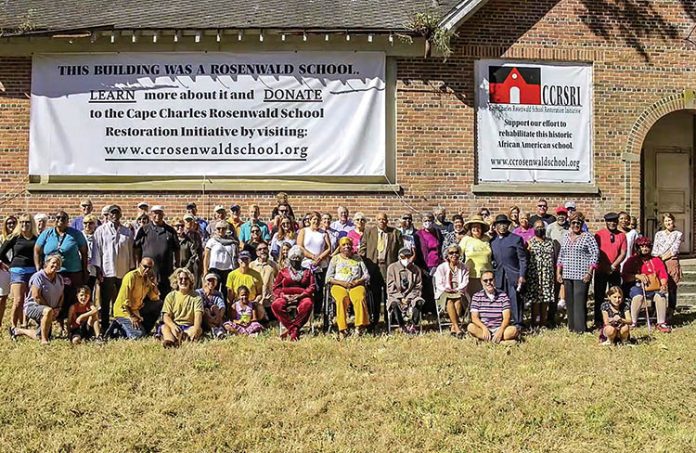
By Stefanie Jackson – The Cape Charles Town Council held a public hearing and voted unanimously Nov. 18 to donate land to the nonprofit Cape Charles Rosenwald School Restoration Initiative (CCRSRI), which seeks to restore the former Cape Charles Elementary School and convert it into a community center.
Cape Charles Elementary School served African American children during segregation but fell into a state of neglect and disrepair in the years following its closing in 1966.
The elementary school was called a Rosenwald school after Julius Rosenwald, a past president of Sears Roebuck who partnered with educator Booker T. Washington during the Jim Crow era to build schools in African American communities.
The lot the town will donate is part of a larger parcel owned by the town, which is more than 14.5 acres and divided into a total of four lots. The entire parcel surrounds the 2.5-acre Cape Charles Rosenwald School property on Old Cape Charles Road.
The Cape Charles-owned parcel is currently leased until 2036 to South Port Investors, a company owned by local developer Eyre Baldwin, but the company supports CCRSRI and has agreed to terminate the lease so Lot 4 of the parcel can be conveyed to CCRSRI.
According to Virginia Code, a locality may dispose of real property by a public or private sale, but first it must hold a public hearing, and the sale must be approved by three-fourths of all members serving on the Town Council.
Town Manager John Hozey clarified that because one council member was absent, a unanimous vote by all members present was needed to meet the three-fourths requirement, which was satisfied.
Once the lease of the parcel is terminated, Lots 1 and 3 will become available for the town’s use; the Cape Charles wastewater facility occupies Lot 2.
Public Comments
Dianne Davis asked the Town Council to discount a suggestion made at a previous meeting that the Old Cape Charles Road area would be an appropriate location for a public basketball court.
The suggestion reminded Davis, who is African American, of “the ‘50s and ‘60s, when the town put our school over the Hump (the overpass that crossed the railroad), behind the dump pile, because they did not want the school that educated African Americans in the main part of the town.”
She also told the Town Council that it is too dangerous for residents of Myrtle Landing Apartments, formerly Heritage Acres, to cross the intersection of Randolph Avenue and Fig Street to reach Rayfield’s Pharmacy when walking with or without a cane or traveling by wheelchair or scooter.
“There have been times when I actually got out of my car to make sure that people have gotten across the street safely. I just do not understand our priorities,” Davis said.
She had previously asked the Town Council for street signs, a crosswalk, or whatever was needed to solve the safety issue, but nothing was done in time for the summer tourist season, she said.
“We can get a golf cart path so that people can get to the brewery safely. We can get ‘No Parking’ signs at the private school. … If you go to the beachfront, you will see a crosswalk, plus you will see signage for walking. What is wrong with this picture?” Davis asked.
She added that the lack of sidewalks in parts of Cape Charles still has not been addressed, a problem that has persisted since the 1970s.
Davis asserted that the Town Council, not the Virginia Department of Transportation (VDOT), is at fault for inaction on the safety issues.
Council members later asked citizens to report concerns about streets and sidewalks to VDOT by calling 1-800-367-7623, which would direct VDOT’s attention to the town’s requests for service.


